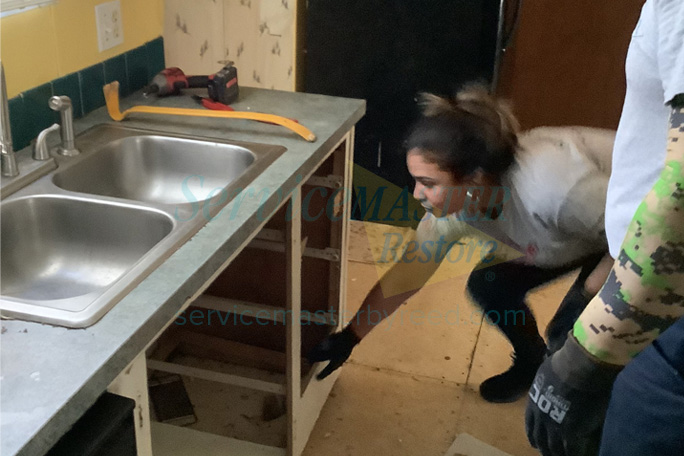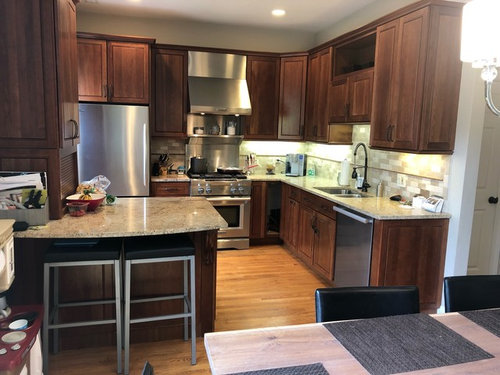Visit Page
What are your opinions on Causes of Water Damage in Kitchen?

The kitchen is the room where a great deal of water activity goes on. You can rarely do anything without utilizing water in the kitchen, from food preparation, cleaning, and doing the recipes.
Therefore, checking your cooking area once in a while is a requirement. This is because it has a greater possibility of getting water damage because of the appliances you make use of there.
When defective, these devices that manage water can make your kitchen unpleasant and impact the structure of your structure in the future.
Let's examine out some causes of the water damage in the kitchen area and also what you should look out for.
Some Root Causes Of Water Problems in the Kitchen area
These are a couple of causes of water damage in the kitchen area.
Faulty Drainpipe Pipes
Drain Pipelines are necessary parts of our homes, specifically in our restrooms as well as cooking areas. They get malfunctioning by obtaining obstructed, cracked, as well as ruptured. Or even worse, they can be wrongly or loosely linked; whichever the instance might be, it can be a severe issue.
Faulty drain pipelines can create water damage and, consequently, create mold and mildew growth as well as damage the appearance of your wall. It can also make the afflicted location look unpleasant.
For that reason, it is a good idea constantly to examine to ensure that all the pipes are in good condition as well as obtain an audio plumbing system to maintain as well as take care of any kind of concerns.
Faulty Cooking Area Sink
The kitchen sink is a vital and many utilized part of the kitchen area. It is vulnerable to water damage; problems such as obstructed pipelines, leaking pipes, and faulty faucets.
These problems can be annoying, specifically when one is active in the cooking area. It doesn't just take place without offering a clue or a sign. So below are some indicators to understand when your sink is not alright
These are the significant damages that can take place to your kitchen area sink. Nonetheless, one method to stop this damages is by guaranteeing that food fragments do not enter the pipes. You are also inspecting the taps and pipelines and making sure that it is properly taken care of and in good condition.
Dripping Dishwasher
Dish washers make life in the kitchen less complicated. It is an optional cooking area home appliance and also, when available, can be a resource of water damage. In addition, like other equipments, it will establish mistakes in time, despite having maintenance.
Among the faults is dripping via the door or below the dishwashing machine. These mistakes develop as a result of age, cracks, wrong use, loosened links to pipes, and so on.
Faults because of age originated from continual usage. Because of this, the door leakages due to opening and also shutting.
Mistakes from the incorrect use may trigger water damage by presenting splits to it. Hence, it is recommended to comply with the hand-operated overview of the dish washer to prevent this particular damage.
The leakages under the dish washer can originate from cracks in the gasket, hose, and wrong or loose connection to water pipes or drains.
This kind of leak frequently goes unnoticed and can be there for a long time. Due to the time framework, it might damage the floor and cause mold and mildew growth.
Much more so, the longer the water stays, you will notice the bending of the flooring where the dishwashing machine is. When examining if your dishwashing machine leaks, this is a good sign to look out for. Detecting as well as fixing this on schedule prevents significant water damage to your floor covering.
Bottom Line
Looking out for problems in your cooking area can be charging but necessary. It makes your job there much easier as well as safer.
Nonetheless, the reasons noted above are only a few variables to think about, particularly if your kitchen has a great deal of home appliances.
Get a specialist plumbing service to come about and examine for any damages as well as obtain them repaired.
It makes your kitchen area damp and untidy, specifically when dripping from the pipelines. And if it is trickling from the faucet, it leads to water wastefulness.
It is an optional kitchen device and, when readily available, can be a source of water damage. A lot more so, the longer the water stays, you will certainly notice the bending of the flooring where the dishwashing machine is. Detecting as well as repairing this on time avoids severe water damage to your floor covering.
WAYS TO PROTECT YOUR KITCHEN FROM WATER DAMAGE
The kitchen is one of the most significant rooms in your house, as it is a multipurpose room wherein you can do your cooking and cleaning. Nowadays, homeowners tend to ignore the problems under their sink or appliances because of their busy schedules. However, most household floods occur due to plumbing and appliance failure. One of the most common scenarios that cause water damage to your kitchen is when the dishwasher malfunctions and floods gallons of water.
Water damage in your kitchen can cause several problems, including cosmetic damage, mold growth, and even an unpleasant smell. Often, if you fail to neglect the problem, there are always consequences. This article will help you protect your kitchen from water damage.
Common Causes of Water damage in your kitchen
Pipe problems are the most common source of water leaks under your sink. If homeowners ignore this issue, it will burst and flood the kitchen. Dishwasher leaks can be a source of water damage in your kitchen. An old, broken, and defective dishwasher can cause leaks, damage to your floor, and even mold growth. Refrigerator leaks can cause water damage in your kitchen, as sometimes melted ice from defrosting can cause leaks. Furthermore, if your refrigerator has internal problems, it is very likely to cause water damage. Back-splash and sink caulking can cause discoloration and water damage to your countertop tiles. Ways to Protect Your Kitchen From Water Damage
Regular maintenance
The most important thing you can do to protect your kitchen from water damage is to inspect the sinks, drains, and pipes, as well as the kitchen appliances, regularly. As with the sink, check for missing or deteriorated caulk. Remove the old caulk and clean the area thoroughly and re-seal it with fresh silicone. Furthermore, sweep the drain regularly, empty the filter and dispose of the debris in the garbage, and inspect the supply lines and valve for cracks.
Check your appliances
Check the user’s manual for instruction and proper use of every water-related appliance installed in your kitchen. For the dishwasher, check this procedure to prevent the dishwasher from flooding your kitchen. Check the appliances that need water, such as the coffee maker, ice maker, and water cooler, as they can become the cause of water damage in your kitchen. You may call a professional to check and repair damaged appliances and professional restoration for water damage clean-up.
Garbage clean-up
Fats, oil, and grease are common in the kitchen. Pouring them down the drain can cause clogs and sewage backup, which may result in significant kitchen water damage. If your kitchen sink is clogged, use a solution of hot water, baking soda, and vinegar to unclog the fats and oils in the pipes. Also, make sure to throw out the debris in the trash and clean the sink properly using paper towels for greases and oil and soap or bleach solution for the sink itself.
Shut off your water line
Make sure to shut off your main water line, especially if you're away and having some flood issue. As mentioned, dishwasher leaks are one of the most common culprits of water damage in the kitchen. So, make sure to only use the dishwasher if someone is at home and available to attend in case a problem arises.
Furthermore, it is also important that every member of your household knows where the shut-off valves are located. So in case of an emergency, they can mitigate the damage by turning off the water source.
Install leak detectors
One of the best ways to catch water damage before it could even cause serious damage to your home or business is by installing a water or leak detector. A leak detector monitors the flow of water through a pipeline, can detect moisture in the air for molds, and tracks the water temperature. Also, it can shut off your water line in case of an emergency. Install leak detectors under the kitchen sink, near the dishwasher and refrigerator.
https://superiorrestore.com/7-ways-to-protect-your-kitchen-from-water-damage/

I found that piece of writing about Water Damage in Kitchen when doing a lookup on the internet. Those who enjoyed reading our blog posting kindly be sure to pass it around. I truly appreciate reading our article about Most Common Causes of Residential Water Damage .
Go Company